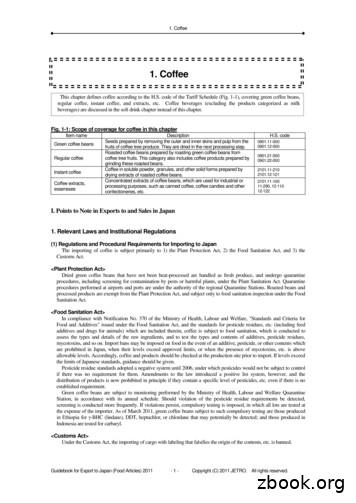Coffee Talk K-12 Counselor - Florida Atlantic University
K-12 CounselorCoffee Talk
Hello & Thank youMs. Christine Abreu School Counselor Grades K-5 ADHUScabreu7@fau.eduDr. Maegan Renee Social-EmotionalCounselor Grades 9-12 FAUHS Campusmrenee@fau.edu2Ms. Ari Osman, LMFT Mental Health Counselor Grades 9-12 FAU Counseling &Psychological Servicesosmana@health.fau.edu
1.Supporting your child’sadjustment during theCOVID-19 crisis!
Supporting Kids During the COVID-19 Crisis Keep routines in place.Be creative about exercise and activities.Manage your own anxiety.Limit consumption of news.Stay connected.Make plans that are within your control.Stay positive.Check-in and set time to talk.4
Keep it age appropriate!Elementary School- provide brief, simpleinformation that balances COVID-19facts with reassurance. Model basichygiene.Middle School- Provide assistance inseparating reality from rumors.High School- Issues can be discussed inmore depth. Refer them to appropriatesources for factual information. Engagethem in decision-making.Encourage all kids to verbalize theirthoughts/feelings. Be a good listener!5
how to avoid passing on your anxietyLearn Healthy TechniquesModel Stress ToleranceExplain Your AnxietyAs you learn methods to toleratestress, you in turn will be teachingyour child-who takes cues from yourbehavior.Be aware of your facialexpressions, word choice, tone ofvoice, and intensity of emotion youexpress.It can be healthy for children tosee their parents cope with stressevery now and then, but you want toexplain why you reacted the waythat you did.Know When to DisengageFind a Support SystemPractice Self-CompassionIf you’re feeling overwhelmed, stepaway and take a break, i.e. taking ashower, going outside for a walk,stepping into another room, takinga few deep breaths.Rely on the people in your life tostep in or offer words of support(therapists, friends, family,co-parents). You can also findsupport online through blogs,parent forums, and social mediaRemember to be reasonable and kindto yourself.6
Should I Worry AboutExtra Screen Time?While limits are still important, it isunderstandable that during these stressfultimes, screen time may increase.
Tips for Managing Screen Time Use social media/technologyfor staying connected. Active parent engagement andoversight. Maintain control and talk aboutnew limits. Increase “healthy” activities Minimize screen exacerbatedanxiety. Model with your own screentime.8
9
How to work with your kids to set healthy boundariesC- Connection: “I see you’re frustrated; it’s hard right now because you want to comeplay in my office.”L- Limit: “I am going to be on a conference call for 20 minutes, and I need helpkeeping my office quiet, so I’m going to ask that you play in the living room.”E- Empowerment: What would you like to do for 20 minutes?”A- Accountability: Set a timer and create an agreement saying, “When this timergoes off, we can play together. I’ll shut my computer, and you can come on in!” thishelps build trust.R- Reconnection: “Thank you for giving me space to make my call; I know that mightnot have been easy, but I appreciate your effort! Let’s play until my next meeting in anhour!”MegAnne Ford - Certified Parenting Coach10
2.Acknowledging the signs:Does my child need additionalsupport?11
“Anything that’s human ismentionable, and anything that ismentionable can be moremanageable. When we talk aboutour feelings, they become lessoverwhelming, less upsetting, andless scary. The people we trustwith that important talk can helpus know that we are not alone.”-Fred Rodgers12
Some Struggles areNormal.but understanding whenyour child may needadditional support isimportant. Trust yourinstincts and during thistime of drastic change,and know it’s ok.13
Warning signs for young children Have frequent tantrums or are intensely irritable much of the time.Often talk about fears or worries.Complain about frequent stomach-aches or headaches with no known medical cause.Are in constant motion and have difficulty concentrating (except when they arewatching videos or playing video-games).Sleep too much or too little, have frequent nightmares, or seem sleepy during theday.Are not interested in playing with other children or have difficulty making friends.Want to avoid going to school or other social settings.Struggle academically or have experienced a recent decline in grades.Repeat actions or check things many times out of fear that something bad mayhappen.14
Warning signs for older children and adolescents Have lost interest in things that they used to enjoy.Sleep too much or too little, or seem sleepy throughout the day and have low energy.Are spending more and more time alone, and avoid social activities with friends or family.Fear gaining weight, or diet or exercise excessively.Engage in self-harm behaviors (e.g., cutting or burning their skin).Smoke, drink alcohol, or use drugs.Engage in risky or destructive behavior alone or with friends.Have thoughts of suicide.Have periods of highly elevated energy and activity, and require much less sleep than usual.Say that they think someone is trying to control their mind or that they hear things thatother people cannot hear.15
Step 1: Pause.This step is important because instead of actingon feelings right away, you stop yourself andthink things through. Count to 100 or say thealphabet backwards.Step 2: Acknowledge What You’re Feeling.PauseAcknowledgeThinkHelpFor example, are you mad at someone, or are yousad because your feelings were hurt by whatthey did? Whatever it is that you are feeling, it isok to feel that way.Step 3: Think.Now that you have taken a few moments tofigure out what exactly it is that you are feeling,think about how you can make yourself feelbetter.Step 4: Help.Take an action to help yourself based upon whatyou came up with in the “Think” step.16
3.how to prepare yourchild to transition backto school.
“Transitions are almost always signs ofgrowth, but they can bring feelings ofloss. To get somewhere new, we mayhave to leave somewhere else behind.”— Fred Rogers18
Elementary Transitions and ConcernsEstablish and Maintain aRoutine!Start preparing children for theupcoming transition 1-2 weeksbefore the start of school. Getback into morning/bedtimeroutines and balancing theirday.Be Honest and Have OpenCommunication!Talk to your children about anydifferences they may experiencewhen returning to school. Alsoexplain any safety tips, healthycoping skills, and ways to reachout to people they can talk to.Be Understanding andSupportive!Your child may be anxious andworried about their return toschool. Understand theirfeelings and let them have anoutlet to express themselves.Validate them and their worriesand acknowledge that startingschool again can be difficult.Sadness Over Missing Events (end-of year field-trips and celebrations)Let them understand and talk through their feelings. Reinforce that their feelings are ok and normal.Work with your children in thinking of new ways to celebrate (virtual field-trips, family exercises,picnics, etc.) and talk about the things to look forward to.19
Middle school transition and concernsAvoid “red-flag” statements. Forexample, “Your teachers will expectmore of you now that you are back inschool vs online.” These type ofstatements can trigger stress andput undue pressure on teens.Create a plan of action for thingsthat are causing anxiety. Ex. I’mafraid I’ll get lost. What if I missbeing at home? What if I don’t haveany friends in my classes?Acknowledge feelings rather than Try solution-focused strategies:dismissing them with “Everything willbe okay.” Instead ask open endedquestions about their concerns. Listen& acknowledge their feelings asnormal, and then talk about copingskills (journaling, meditation, music)What did you do that helped last timeyou experienced: missing home, nothaving friends in your class, gettinglost. This encourages students tothink creatively and find their ownsolutions.20If transitioning to a newschool:-Explore the school’s website withyour child. Search for virtual tours,announcements, schedules, andevents. If you can’t visit the school,try to drive by one day.-Avoid overreacting about grades. Letyour child adjust the first few weeks.-Encourage your child to ask for helpfrom teachers, classmates, orcounselors.
High school transition and concerns Sadness over loss of developmental milestones (graduation, prom, grad-bash, on-campusliving).- Let them feel how they are feeling.- Work with your senior in brainstorming ways to celebrate, i.e a virtual graduationceremony or a makeup prom.College concerns:- Cancelled orientations, decision deadlines, campus visits.- Many colleges already have virtual tours online.- Join social media groups to get to know other students.- Many schools moved their decision deadlines to June 1st.- Connect with admissions advisers.- Communicate and stay-informed, discuss pros and cons.21
Be kind toyourself!22
ResourcesHelpful vs Harmful: Ways to Manage EmotionsHelping Teens Learn to Manage TransitionsHow to Manage Your Mental Health When Feeling Stressed During Covid-19Sesame Street-CaringSmoothing your Child’s Transition to Middle SchoolTeens & COVID-19: Challenges and Opportunities During the OutbreakYouth Mental Health: Emotions Matter23
Thanks!Any questions?Parent Feedback Form24
FAU Counseling & Psychological Services osmana@health.fau.edu Ms. Christine Abreu School Counselor Grades K-5 ADHUS cabreu7@fau.edu Dr. Maegan Renee Social-Emotional Counselor Grades 9-12 FAUHS Campus mrenee@fau.edu
Mrs. Rebecca Heinzmann, School Counselor A-Coh Mrs. Christina Head, School Counselor Coi-Go Mrs. Rebecca Heinzmann, School Counselor Gr-K and AICE Mr. Michael Esposita, School Counselor L-Odr Mrs. Holly Arnaud, School Counselor Oe-Sek Ms. Angela Jackson-Miller, School Counselor Sel-Z Mrs. Laura Brewer, School Counselor Moving of Tassels
Coffee: The quality of the coffee and water used is directly related to the quality of the coffee brewed. We highly recommend using freshly ground coffee or commercially packed coffee that is sealed for freshness. The proper amount of ground coffee and water is critical to the finished brew. A ratio of 2 Tablespoons of coffee for every 6 oz. of .
drink coffee, coffee samples based on each of the following six brewing methods were analysed: Filter coffee brewed coffee maker, French press coffee, boiling coffee, coffee brewed in mocha pot, home-brewed espresso and espresso from cafes. The water used f
May 23, 2012 · coffee-shop owners have shifted away from traditional coffee preparation methods to European-style coffee-brewing techniques. Trade: The Tanzanian Coffee Board conducts coffee auctions in Moshi, Tanzania at the base of Mt. Kilimanjaro. Below, please find export data provided by the Tanzania Coffee Board. Tan
Dr. Gerson, Dr. Kelley, Dr. Gonzales, And Others 2. Coffee, A Remarkable Herb What Is Coffee? Growing And Processing Of Coffee The Best Coffee For Coffee Enemas Coffee As A Beverage 3. Effects Of Coffee Enemas Eff
Short Coffee 3 oz (90 ml) Coffee 9 oz (270 ml) Long Coffee 12 oz (360 ml) MY COFFEE The My Coffee setting allows the user to select any volume between 1 oz and 7 oz. 1 Press multiple times until "MY COFFEE" is displayed. 2 Press and hold until "MY COFFEE—PROGRAM QUANTITY" is displayed, then release. 3 Once the desired amount is .
Coffee Machine / User Manual 5 / 147 EN Do not start to cook coffee without putting water into the coffee pot. Do not put any substances apart from coffee, sugar and water into the coffee pot. Do not drink the cooked coffee using the coffee pot. Due to the manufacturing technology, steam and odour may arise at the heating element of your .
Roasted coffee beans prepared by roasting green coffee beans from coffee tree fruits. This category also includes coffee products prepared by grinding these roasted beans. 0901.21-000 0901.22-000 Instant coffee Coffee in soluble powder, granules, and other solid forms prepared by drying extracts of roasted coffee beans. 2101.11-210 2101.12-121 .























